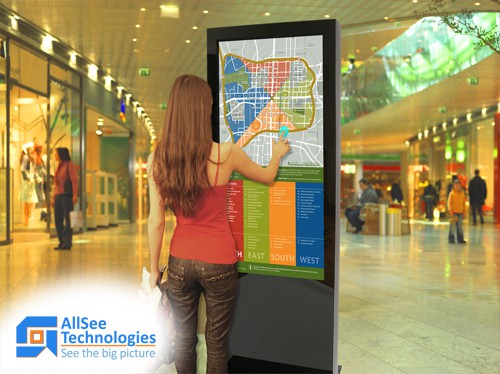
Touch Screen Digital Signage: uses, applications and advantages.
You would be seriously mistaken to think that touch screen digital signage is just another marketing novelty. Touch screen displays provide the opportunity for something that will become increasingly important to digital signage in the coming years; interactivity.
The average consumer’s life is shaped by screens and interactivity, from using the office computer and watching TV at home to using your mobile phone and tablet for online shopping and entertainment. There are countless applications for touch screen digital signage. This article explores some of the most common.
Touch screens now give retailers the scope to connect with their potential customers in ways and settings that have never been possible. This allows them to make the shopping experience more customer-centric. Instant tactile control keeps the ever dwindling attention span of the customer for longer, establishing a stronger communicational connection making for a more likely return on investment. As well as having its place at the point of sale and the point of purchase, touch screen displays can also be used as a promotional tool for products and services, both in store and in more open retail environments. For example, a pharmacy could have touch screen displays promoting products from their toiletry range or you could have a touch screen display in a shopping centre promoting products at a nearby store, helping them to bring in more customers. These retail touch screen displays can also offer information on a product such as reviews, product details and recommend complimentary products, much like the familiar online shopping model.
There are other applications for touch screens outside of the retail environment. A popular use for touch screen digital signage is wayfinding. Public maps can often be very large without presenting any additional information about the featured locations. Touch screen digital signage provides the potential not only to navigate and direct, but also inform the user on an interactive level.
Touch screen digital signage can also be used for infotainment. Hospitality venues such as hotels, theatres and concert halls can capitalise on touch screen digital signage by displaying seasonal, weekly and up to the minute event information in an engaging manner.
Another intuitive application for touch screens is in education. Touch screen digital signage can be used as a communal sensory educational tool. Although this application only relates to young children, touch screen digital signage is also suitable as a digital whiteboard, without having to use a projector. Similarly this application is also suited to the corporate environment.
Explore the world of touch screen displays and you will conclude one thing above all else; when you introduce the element of interactivity to digital signage the possibilities and potential environments, are virtually boundless.

Thomas Fraser-Bacon is the Marketing Director for Allsee Technologies. His background is in Digital Signage and Product Design.


